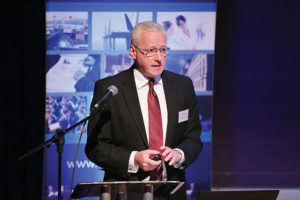CPD infrastructure action plan
 Des Armstrong, Director of the Central Procurement Directorate (CPD) outlines the central issues that CPD has put forward in its infrastructure action plan aiming to improve effectiveness in securing the right infrastructure to advance Northern Ireland.
Des Armstrong, Director of the Central Procurement Directorate (CPD) outlines the central issues that CPD has put forward in its infrastructure action plan aiming to improve effectiveness in securing the right infrastructure to advance Northern Ireland.
The Central Procurement Directorate is well aware of the benefits that efficient infrastructure can play in effective delivery of public services, growing the local economy and making Northern Ireland an attractive place to do business globally.
They believe that given the current pressures on infrastructure in Northern Ireland, tied in with the limited budget for infrastructural investment, there is no room for failure within the delivery of projects and that a greater squeeze needs to be placed on ensuring that any creases in the system are identified and ironed out.
One of the proposals being put forward by CPD is the recognition of a two phase approach to procurement through a regional infrastructure plan. One phase focusing on the conditioning of projects and the skills needed to ensure that it is done effectively, while the other phase concentrates on ensuring that contracts are in place to deliver the necessary requirements.
“Quite often all of the issues that we have are caught up within the term procurement. I think that we need to understand that although there is a procurement life cycle, from development of a need through to disposal of the asset, there are different stages within that procurement life cycle where the players change,” said Armstrong.
 In 2013 the CBI NI Infrastructure Report identified the need for urgent reform of the system for commissioning, procurement and delivery and called for a new centralised procurement and delivery agency. Similarly, the Construction Employers Federation (CEF) called for a new agency by the end of 2017 and a recent Executive initiative has targeted producing and consolidating CoPEs, raising concerns that too much focus was being placed on procurement section of infrastructure and potentially missing other issues “further upstream”.
In 2013 the CBI NI Infrastructure Report identified the need for urgent reform of the system for commissioning, procurement and delivery and called for a new centralised procurement and delivery agency. Similarly, the Construction Employers Federation (CEF) called for a new agency by the end of 2017 and a recent Executive initiative has targeted producing and consolidating CoPEs, raising concerns that too much focus was being placed on procurement section of infrastructure and potentially missing other issues “further upstream”.
CPD, working to the Procurement Board, has since drafted an infrastructure action plan designed to address issues within the system. It focuses on the commissioning phase and then focuses on the procurement and delivering phase as two separate sectors.
“We recognise that skills and skill’s base in the public sector is a significant issue. Business cases and economic appraisals seem to be a process that people believe is slow, plodding and ineffective. We talk about proportionate business cases but people say they have never seen one. We get big thick books of business cases and we’ve got to ask ourselves is that the right way to do things,” said Armstrong.
“Commissioning is an issue where skills are falling short and I think that is one of the issues that Strategic Investment Board (SIB) are addressing by bringing people into the commissioning area. Project management/contract management and the whole issue of how we specify work needs to be addressed. CPD has been given a piece of work as part of the cross-cutting reform programme to look at how we can improve skills in the public sector around commissioning contract management/project management.”
CPD have stressed that despite changes proposed under the action plan, value for money must remain a key element of infrastructure in Northern Ireland.
“The refreshing of our construction procurement policy framework gives us the strategic and overarching policy themes that we believe will bring value for money in construction,” said Armstrong. “It recognises best practices at the moment but it also commits us to continue to improve and understand where the issues have arisen in project delivery. It allows us to bring that back into our policy work and means that we can be better placed going forward with our future projects.”
Welcoming the Programme for Government’s pledge to continue with the flagship projects laid out in the Fresh Start Agreement, he added: “Those to me look like strategic projects for Northern Ireland and perhaps are the starting point for a regional infrastructure plan agreed by the Executive.”





